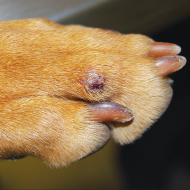
The most common type of skin mass in dogs under one year of age was a histiocytoma.
A large retrospective study published in the Journal of Small Animal Practice(JSAP) has identified the most common skin masses in dogs aged between zero and 12 months.
Using records from a large commercial diagnostic laboratory, researchers found that histiocytomas, papillomas, dermoid cysts, follicular cysts and mast cell tumours (MCTs) were the most common skin masses in dogs under one year old.
The study, titled: 'Skin masses in dogs under 1 year of age: 2554 cases (2006-2013)', used records submitted for histopathology from dogs under the age of one from veterinary practices based in the UK and Europe.
Corresponding author for the paper, Professor Ken Smith, said: “A total of 2553 submissions for a skin mass were included in the study. Across all the skin masses, the majority (94.3%) were neoplastic in nature.
“Of the neoplastic lesions, 98.5% were considered benign. Almost all of the benign neoplastic lesions were of round cell origin (94.0%), whereas most of the non-neoplastic lesions were derived from the epithelium (93.8%).
“The most common histopathological diagnoses for skin masses were histiocytoma (86.6%), papilloma (3.5%), dermoid cyst (3.3%), follicular cyst (1.7%) and MCT (1.4%).
“Multivariable analysis revealed that Labrador retrievers, Boxers and Golden retrievers had reduced odds of histiocytoma compared to crossbreed dogs. Male neutered dogs had lower odds of dermoid cyst compared with female entire animals.
“Dogs aged 9 to 12 months had significantly higher odds of follicular cyst compared with dogs aged under 6 months, whilst dogs aged over 6 months showed significantly higher odds of MCT than dogs under 6 months of age.”
Nicola Di Girolamo, Editor of JSAP, added: “Retrospective studies that include a large number of cases such as this one are an invaluable resource for clinicians working in any setting.
“The findings of this study corroborate those of previous research, suggesting that a skin mass in a young dog is very likely to be a histiocytoma.
“However, the risk factor analysis in this paper identified a number of different predilections to those previously recognised, indicating a need for continued research in this area.”
Image (C) BSAVA Manual of Canine Practice



 The Veterinary Medicines Directorate (VMD) is inviting applications from veterinary students to attend a one-week extramural studies (EMS) placement in July 2026.
The Veterinary Medicines Directorate (VMD) is inviting applications from veterinary students to attend a one-week extramural studies (EMS) placement in July 2026.